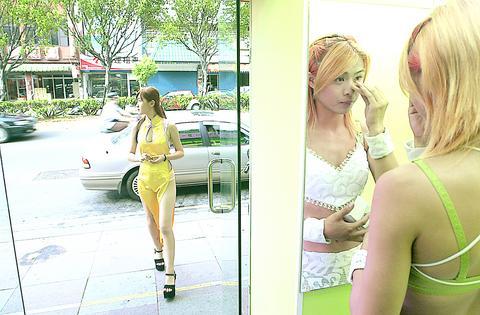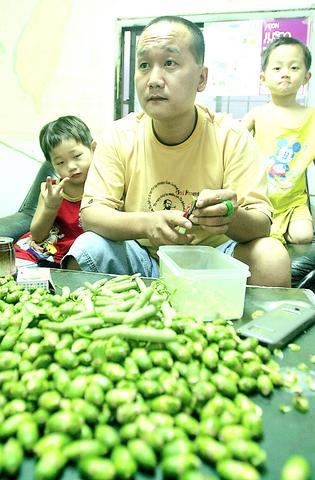Around 9am, Wu Sheng-kuang (
On the wall is a card with employee regulations: makeup must be worn at all times when working; employees should clock in only after changing and putting on makeup. After the girls arrive, Wu rolls up the iron doors and switches on the neon lights of his glass booth. His shop, Hot China Girls (
The shop is right next to the highway entrance going from Hsinchu to Taipei, a perfect location for the glass showcases from which the betel nut beauties peddle their wares. Along a 100m stretch of road there are seven betel nut stands, each decorated with colorful neon. In between there are stalls selling Hsinchu specialties such as rice noodles and meatballs. Wu owns two of these stalls and another betel nut stall called Miss China (中國小姐), only a few meters away from Hot China Girls.

PHOTO: GEORGE TSRONG, TAIPEI TIMES
Wu has been running betel nut stands for more than 10 years, and says he was one of the first to set up at this location. From the start, he decided that girls were to be a major part of the operation. "I knew that the girls would be the key to my business, so I treat them very well," he said.
Wu said he pays the girls NT$40,000 a month. He also buys them sexy costumes and platform shoes. "If the girls wear clothes they don't like, they feel unhappy and are less motivated. This is bad for business," Wu said.
It is a woman's world inside the glass betel nut stand. The small counter is covered with cosmetics: Japanese eye-shadow cases, shiny colored lipsticks and mascara. On the side in the small cabinet, there are piles of sexy costumes. They are all very skimpy so they don't take up much space.

Wu does not show up at the betel nut stand very often, spending most of his time upstairs preparing the betel nuts, but keeping an eye on the girls and business generally through surveillance cameras. "If there is a man inside the stall, customers will not usually approach the stall," he said.
When reporting this story, Wu asked our male photographer not to stand inside the stall for too long. He said to me: "You're a girl. It's OK for you to stay here." This was simply for the good of his business.
Ting-ting (

Like her work mates Hsiao-yeh (
According to Wu, the girls at his stand can enjoy the most luxurious treatment. They don't need to prepare the betel nuts themselves, as all the nuts are prepared and packed before hand. All they need to do is welcome customers who pull up by the stall. They are basically sales girls. "If you sell more than NT$10,000 a day, you get a bonus of NT$300," Wu said.
Pretty girls have become so much part of the business that Wu is willing to spend between NT$1,000 to NT$3,000 per dress for the girls. Despite this expense, Wu says he still manages a net profit of at least NT$100,000 a month. And that is just from Hot China Girls.
Hsiao-min, 19, a student at a technical college, also takes an afternoon shift. She wears a long yellow dress that is slit almost up to her waist. Hsiao-yeh, 18, her companion on the shift, wears a white tank top and mini-skirt.
Both Hsiao-yeh and Hsiao-min's clothes were designed by Annie (who declined to give her last name), the owner and designer of Annie's Hot Girl Costume Workshop (
Every day, Annie drives her van, stopping at betel nut stands across the island promoting her betel nut beauty costumes. In six years, she has become a major clothing supplier for Wu's betel nut stall. "On average, I stop at around five to 10 betel nut stands a day, showing samples to the owners," Annie said. She said she is the only supplier who provides designs specifically targeted at betel nuts girls.
Annie, who has many friends working in the betel nut industry, said that her clothes gave the girls more style than those purchased at the night markets. Her business has now expanded to providing clothes for girls working in clubs and bars and for girls working in motor racing venues such as Lungtan in Taoyuan County.
For the girls like Hsiao-yeh and Hsiao-min, apart from the long hours standing in high heels, this is not a bad job. You can wear fancy clothes at work and listen to your favorite music. Once in a while, admirers give them red envelopes of money, flowers or expensive gifts. On the counter, there is a big bouquet of flowers sent by an admirer of Hsiao-yeh's. Hsiao-min is even luckier. She was given the latest pink Panasonic mobile phone by an admirer. Last month, she also received a gold necklace.
"Some of the customers have become friends and sometimes they'll even buy you a lunch box," said Hsiao-yeh. When faced with customers who want more than just betel nuts, Hsiao-yeh said they are sent packing: "We just give them a cold look and say we don't sell that here."
For customers who think they can take advantage, Wu said they might find themselves beaten up. "We make them apologize and they must give the girls a considerable sum of money in a red envelope," Wu said.
Wu acknowledged that some stands had girls who wore no underwear or who were available for sexual services, but insisted that his stalls had nothing to do with that aspect of the business. "Our main business is to sell betel nuts and the most important part is that you have to have pretty girls," he said.
"Besides, those who offer sex are mostly the ugly girls," he added.

The canonical shot of an East Asian city is a night skyline studded with towering apartment and office buildings, bright with neon and plastic signage, a landscape of energy and modernity. Another classic image is the same city seen from above, in which identical apartment towers march across the city, spilling out over nearby geography, like stylized soldiers colonizing new territory in a board game. Densely populated dynamic conurbations of money, technological innovation and convenience, it is hard to see the cities of East Asia as what they truly are: necropolises. Why is this? The East Asian development model, with

June 16 to June 22 The following flyer appeared on the streets of Hsinchu on June 12, 1895: “Taipei has already fallen to the Japanese barbarians, who have brought great misery to our land and people. We heard that the Japanese occupiers will tax our gardens, our houses, our bodies, and even our chickens, dogs, cows and pigs. They wear their hair wild, carve their teeth, tattoo their foreheads, wear strange clothes and speak a strange language. How can we be ruled by such people?” Posted by civilian militia leader Wu Tang-hsing (吳湯興), it was a call to arms to retake

This is a deeply unsettling period in Taiwan. Uncertainties are everywhere while everyone waits for a small army of other shoes to drop on nearly every front. During challenging times, interesting political changes can happen, yet all three major political parties are beset with scandals, strife and self-inflicted wounds. As the ruling party, the Democratic Progressive Party (DPP) is held accountable for not only the challenges to the party, but also the nation. Taiwan is geopolitically and economically under threat. Domestically, the administration is under siege by the opposition-controlled legislature and growing discontent with what opponents characterize as arrogant, autocratic

When Lisa, 20, laces into her ultra-high heels for her shift at a strip club in Ukraine’s Kharkiv, she knows that aside from dancing, she will have to comfort traumatized soldiers. Since Russia’s 2022 invasion, exhausted troops are the main clientele of the Flash Dancers club in the center of the northeastern city, just 20 kilometers from Russian forces. For some customers, it provides an “escape” from the war, said Valerya Zavatska — a 25-year-old law graduate who runs the club with her mother, an ex-dancer. But many are not there just for the show. They “want to talk about what hurts,” she